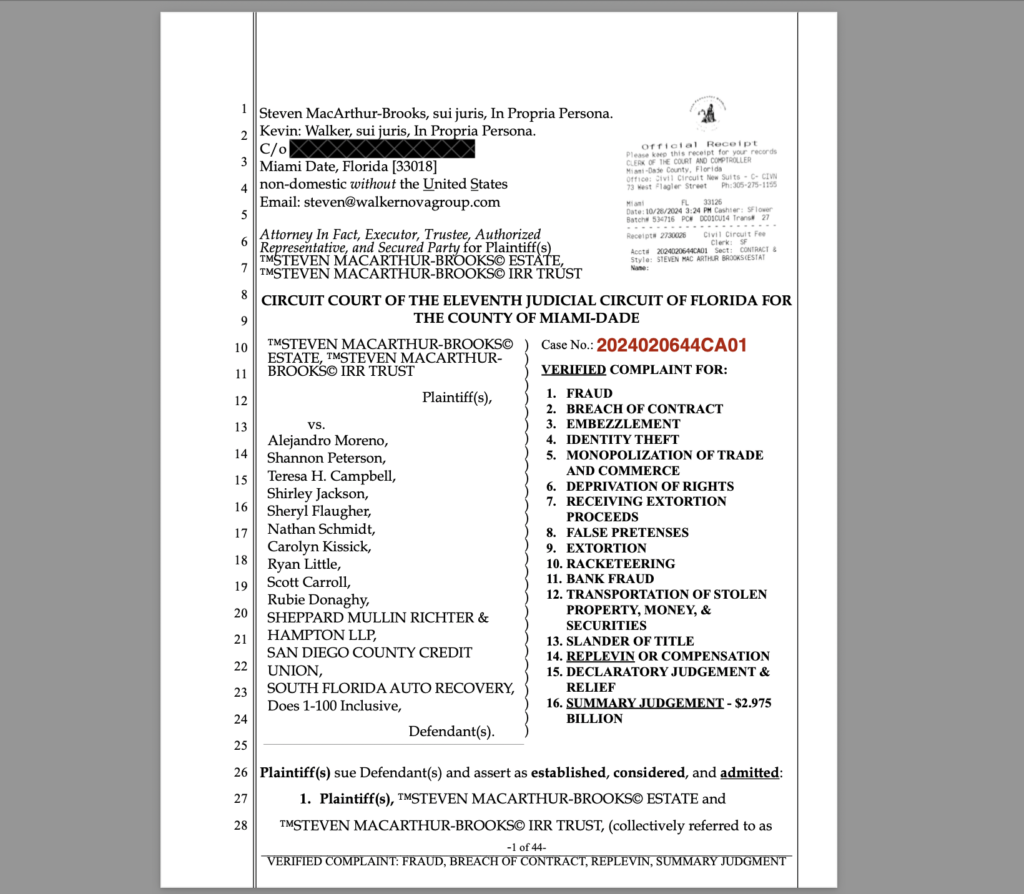In a monumental legal filing, ™STEVEN MACARTHUR-BROOKS© ESTATE and ™STEVEN MACARTHUR-BROOKS© IRR TRUST, referred to collectively as “Plaintiffs,” have sought summary judgment in the amount of $2.975 billion against the San Diego County Credit Union and multiple affiliated defendants, including Alejandro Moreno, Shannon Peterson, Teresa H. Campbell, Shirley Jackson, Sheryl Flaugher, Nathan Schmidt, Carolyn Kissick, Ryan Little, Scott Carroll, Rubie Donaghy, and SHEPPARD MULLIN RICHTER & HAMPTON LLP. The lawsuit asserts that these defendants, by accepting, considering, and signing specific contracts and affidavits, are now obligated by the terms of these agreements and related laws to the financial liabilities detailed in Plaintiffs’ claims.
The plaintiffs are recognized as trustees, fiduciaries, and ‘holders in due course’ of all assets, including both tangible and intangible property. Under their authority as “holders in due course” and creditors, ™STEVEN MACARTHUR-BROOKS© ESTATE and ™STEVEN MACARTHUR-BROOKS© IRR TRUST bring forth the claim as the Real Parties in Interest. The defendants in this case, collectively identified as “debtors,” lack any lawful claim or standing over the assets involved, including the 2018 GMC Sierra 1500, VIN #xxxxxxxxxxxxxxxx, and all assets detailed in UCC1 and UCC3 filings attached to the complaint. This title and ownership status, as filed in the Nevada Secretary of State’s office, unambiguously lists Plaintiffs as the rightful holders.
Contractual Agreement Established Through Unrebutted Affidavits
Plaintiffs submitted a notarized, self-executing Contract and Security Agreement, designated as Exhibit E, which was received, signed, and accepted by Defendants under Registered Mail #RFxxxxxxxxxUS. This contract, supported by the mailbox rule and tacit acquiescence principles, establishes that Defendants’ silence and non-response legally confirm their acceptance. By contract law and the Uniform Commercial Code (UCC), particularly under § 2-202, the defendants’ tacit agreement formed a binding contract and summary judgment authorization in favor of the Plaintiffs, with an amount specified at $2.975 billion. This was further substantiated by a formal INVOICE/TRUE BILL, #SANDIEGOCREDITDISHONOR24, detailing the Defendants’ obligation.
Verified Commercial Affidavits Uphold Plaintiffs’ Claims
Verified commercial affidavits, which Defendants have received, considered, and accepted without contest, detail Plaintiffs’ standing as the real and sole creditors in this matter. Each affidavit explicitly outlines Plaintiffs’ ownership of the assets and the obligations incurred by Defendants. Delivered via USPS forms 3811 for receipt verification, these affidavits included statements of default, fraud, and dishonor, securing a contractually recognized finality in the findings. This comprehensive acceptance by Defendants has been noted in multiple exhibits, including the initial security agreement (Exhibit E) and further notices (Exhibits F, H, J). As established by commercial law, unrebutted affidavits are legally considered binding and indisputable; Defendants are thereby precluded from any argument or opposition to these facts.
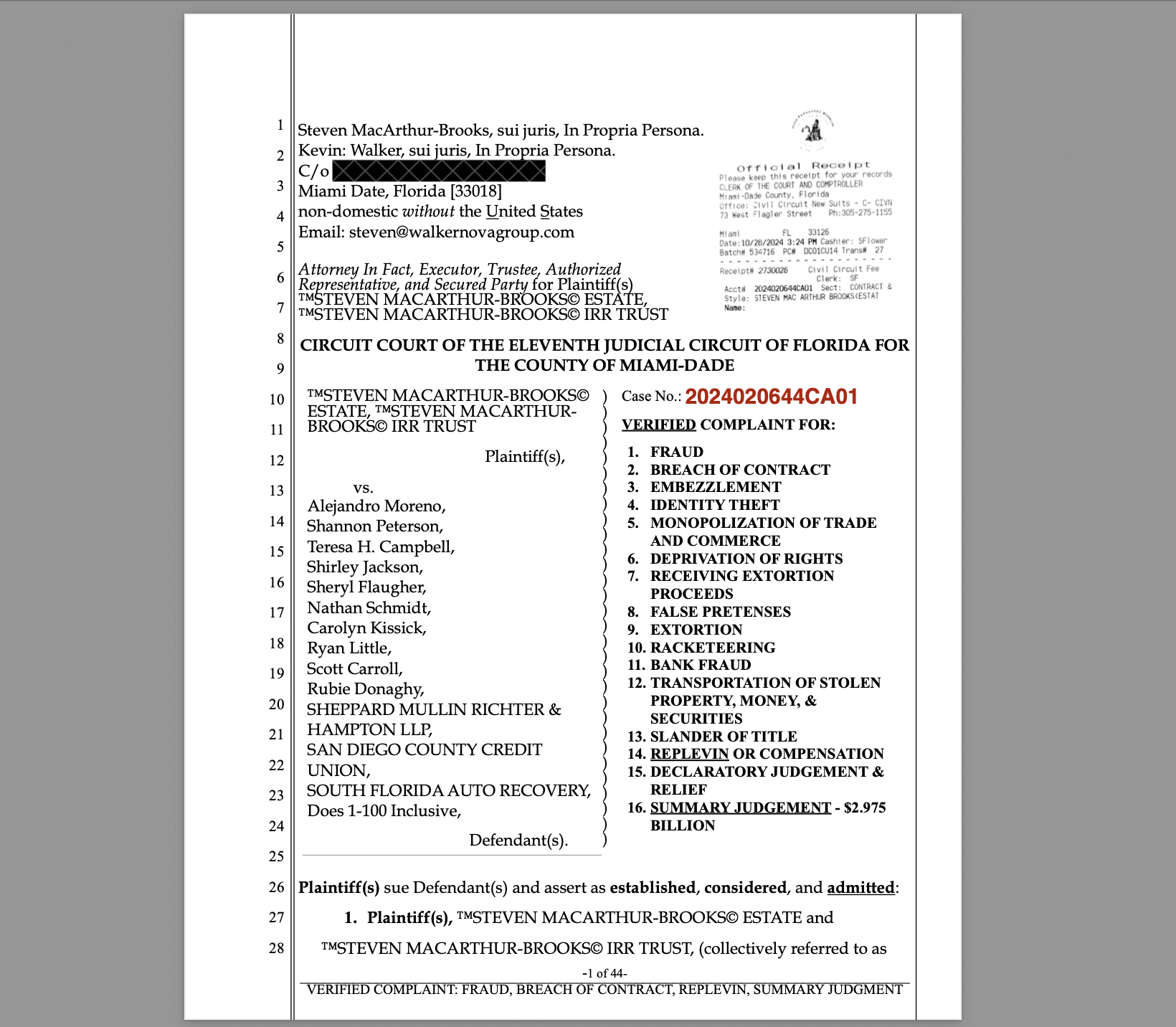
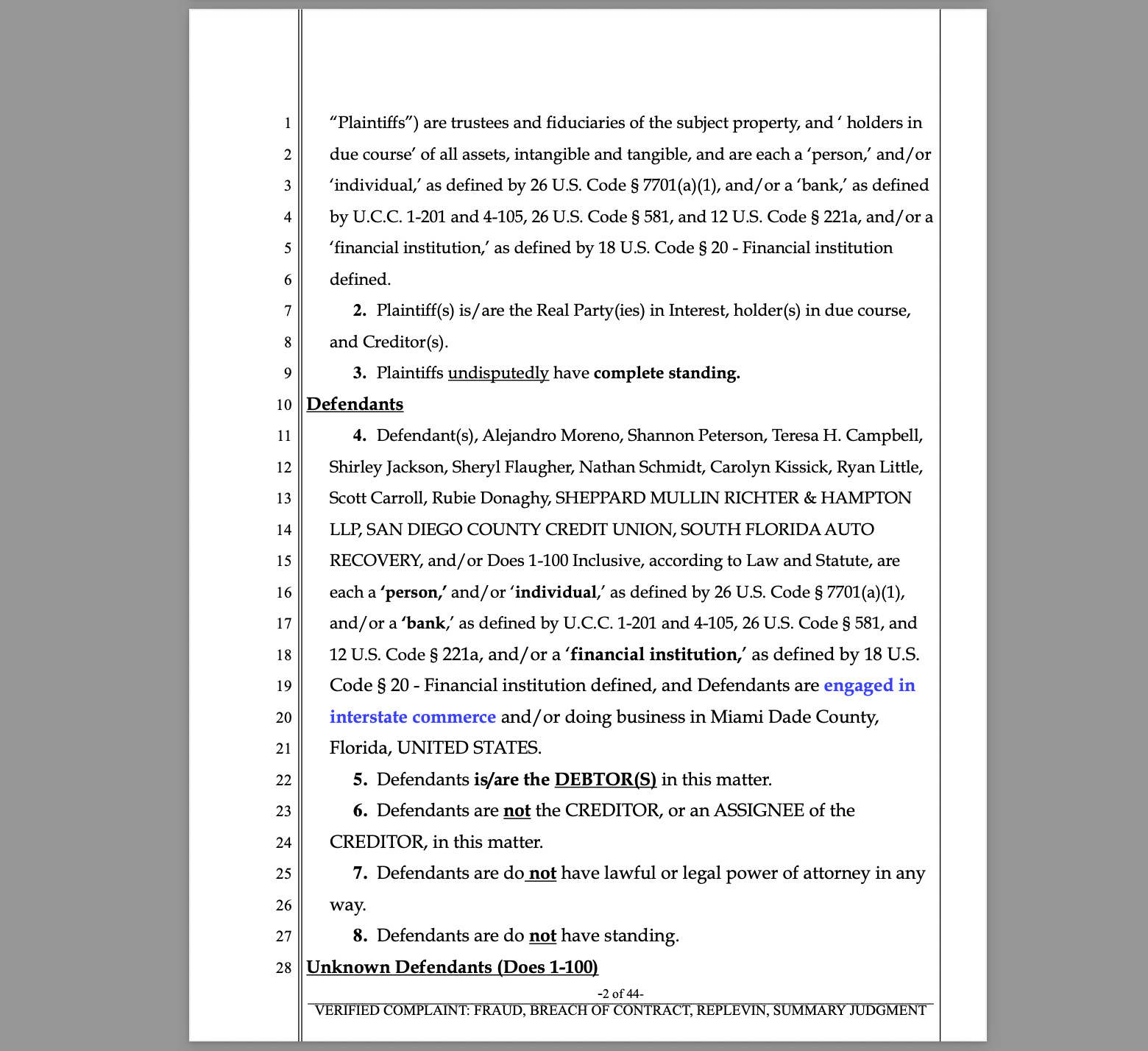
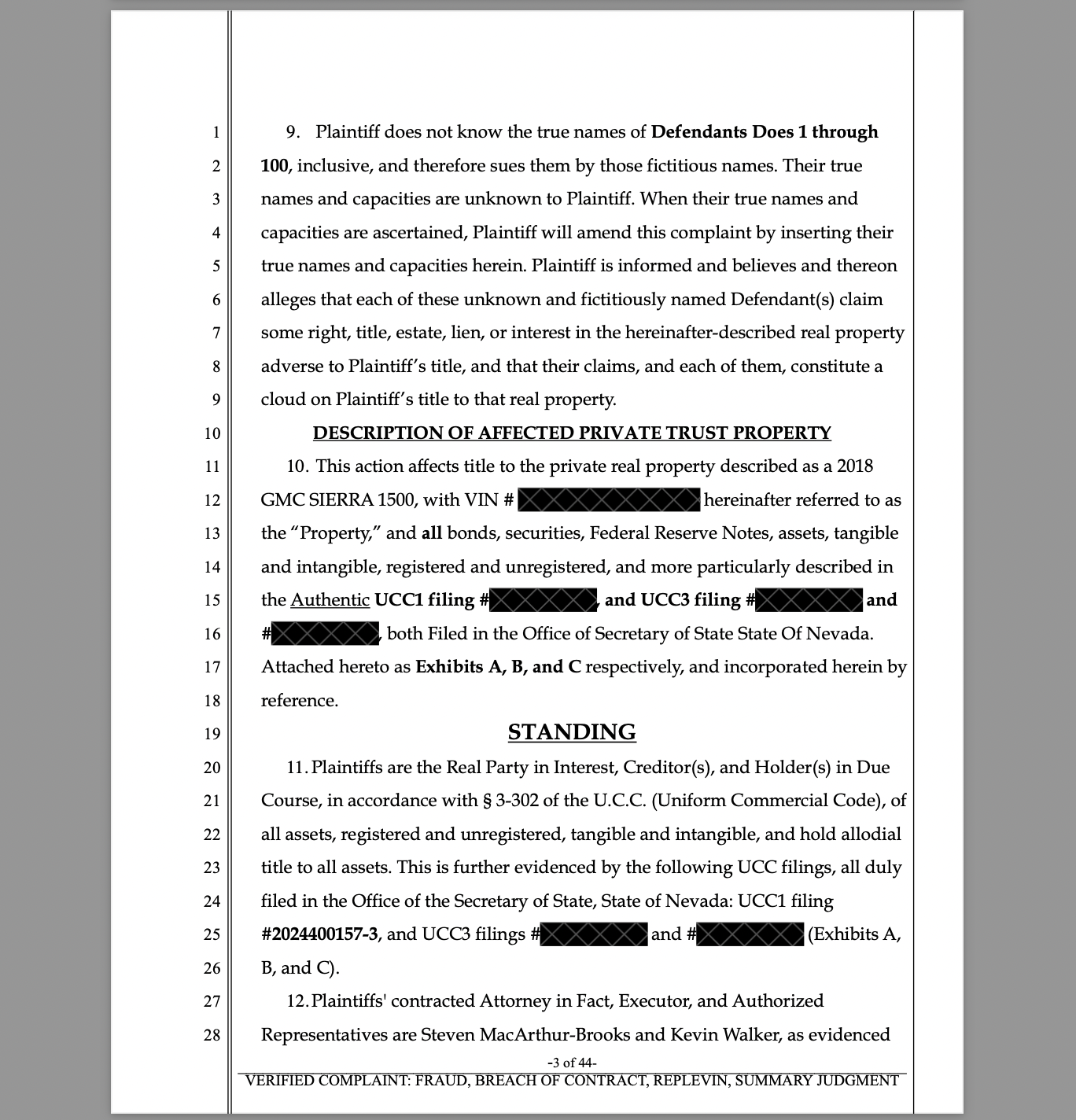
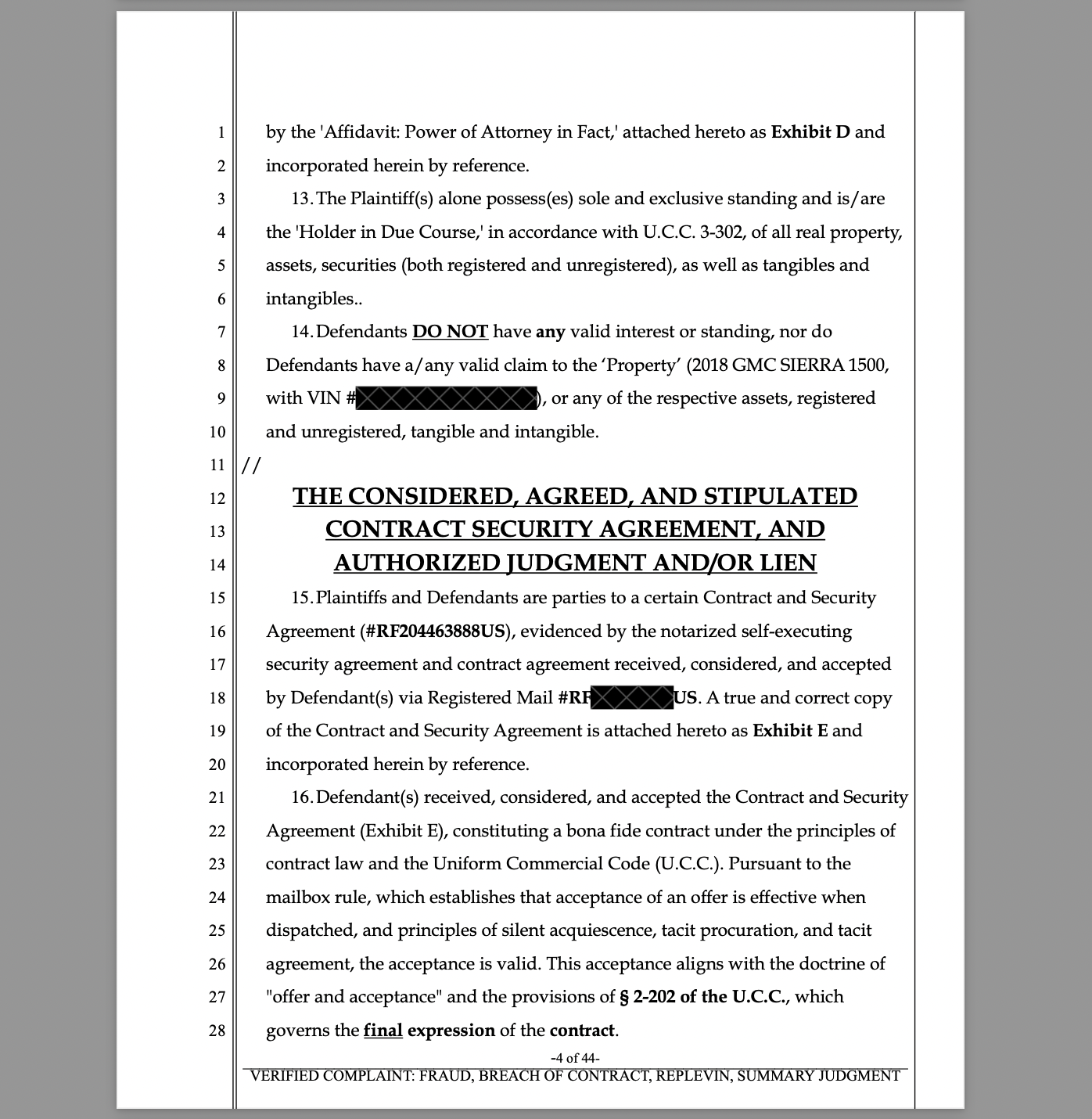
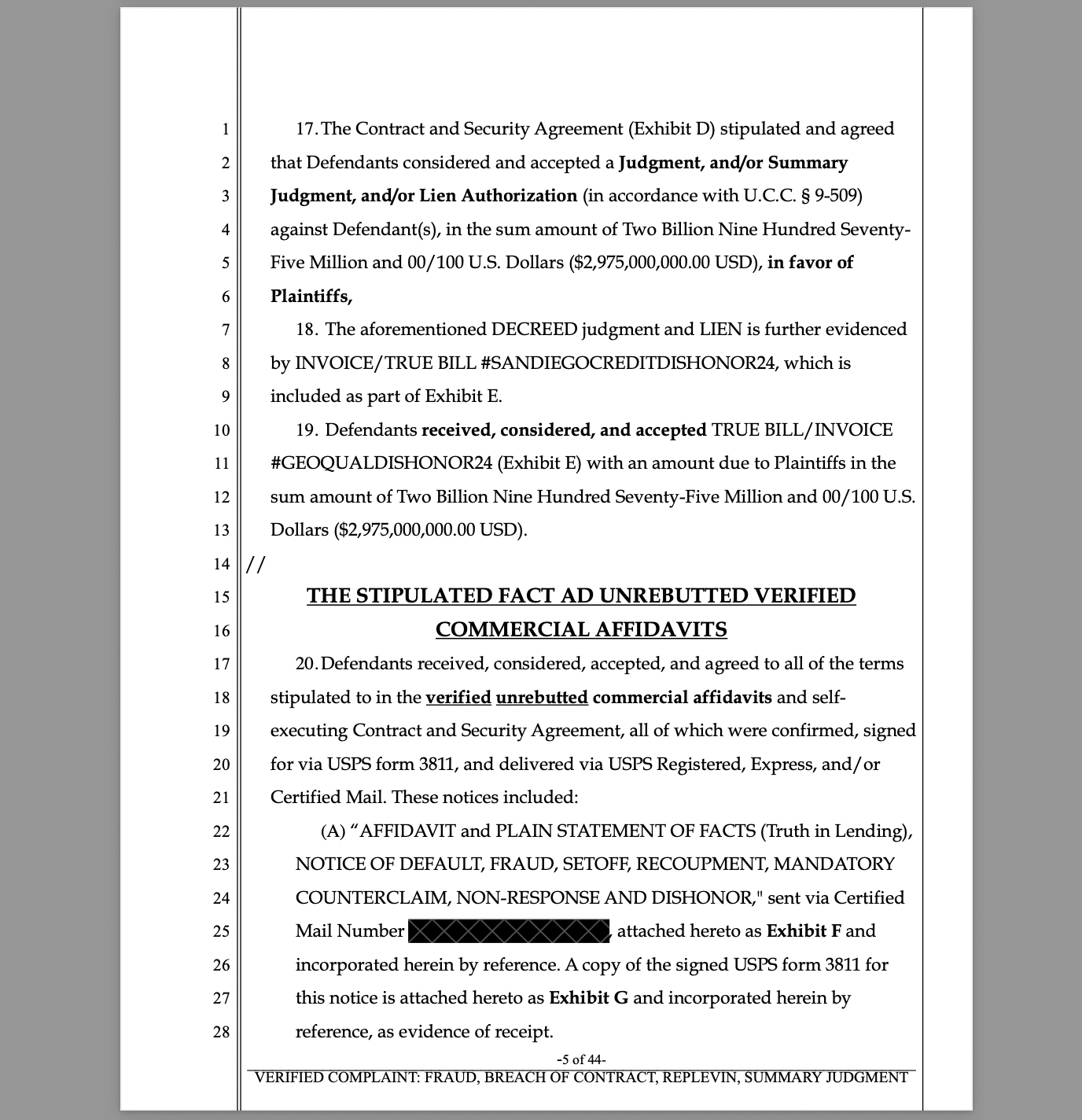
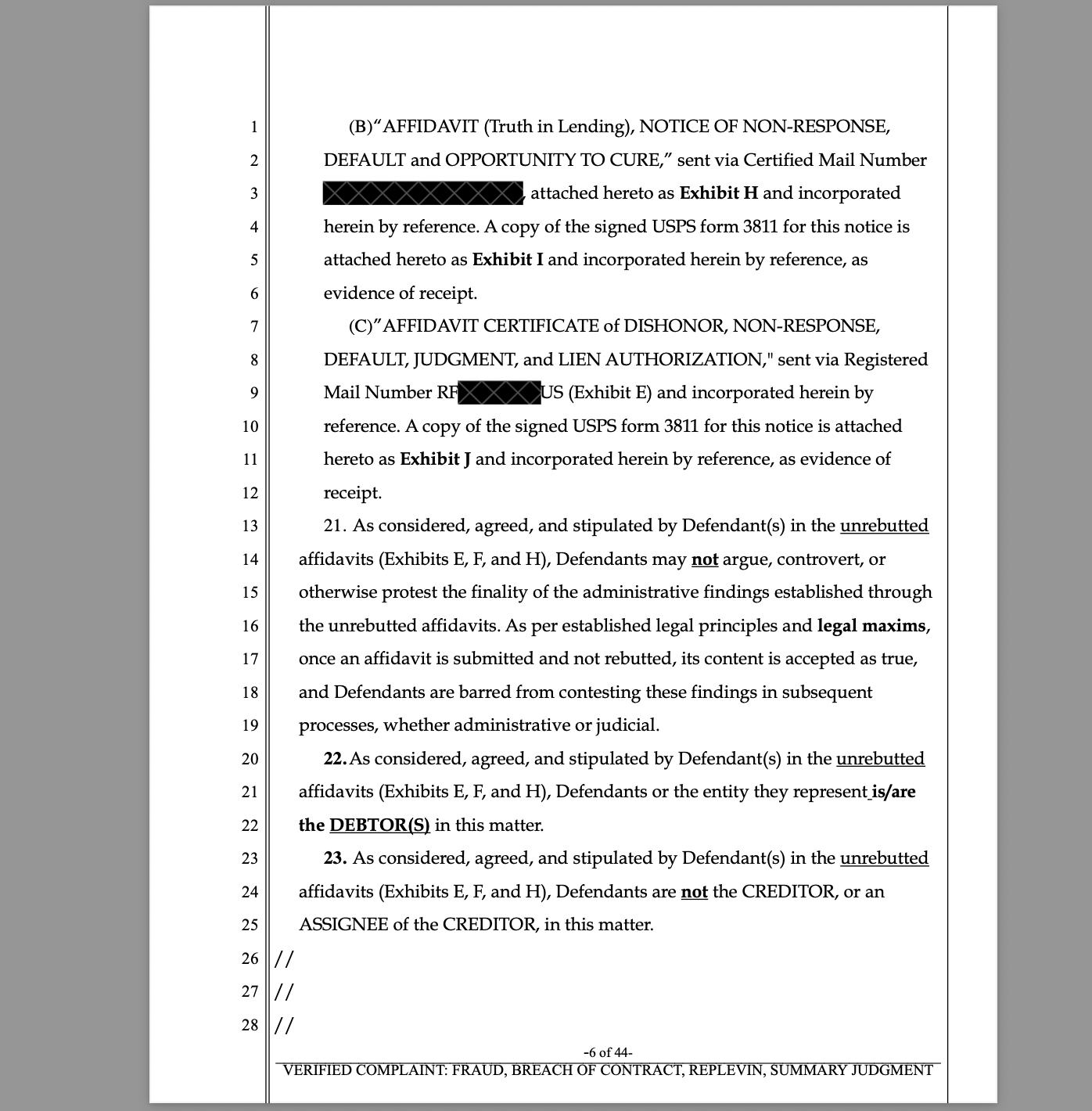
Summary Judgment and Lien Against Defendants
Plaintiffs’ filings with the Nevada Secretary of State further substantiate their claim. The lien in question is confirmed under UCC § 9-509, granting Plaintiffs undisputed legal rights over the $2.975 billion liability. This lien, legally stipulated by both contract and statutory law, is authorized and executed based on Defendants’ acceptance of the facts and terms outlined in the unrebutted affidavits. Consequently, the Defendants have accepted their role as debtors in this matter, with Plaintiffs firmly recognized as the creditors.
- Florida Rule of Civil Procedure 1.510(a): Summary judgment is appropriate where there is no genuine issue as to any material fact and the moving party is entitled to judgment as a matter of law. The unrebutted affidavits submitted by Plaintiff(s) establish that there are no genuine issues of material fact in dispute, and Plaintiffs are entitled to judgment based on the evidence presented and as a matter of law.
- California Code of Civil Procedure § 437c(c): Summary judgment is appropriate when there is no triable issue of material fact and the moving party is entitled to judgment as a matter of law. The unrebutted affidavits submitted by Plaintiff(s) demonstrate that no triable issues of material fact remain in dispute, and Plaintiffs are entitled to judgment based on the evidence presented and as a matter of law.
- Res Judicata, Stare Decisis, and Collateral Estoppel: The principles of res judicata, stare decisis, and collateral estoppel apply to the unrebutted affidavits, establishing that all issues are deemed settled and cannot be contested further. These principles reinforce the finality of the administrative findings and support the granting of summary judgment.
Tender of Payment and Dollar-for-Dollar Discharge
Plaintiffs tendered payment for settlement and satisfaction of this debt, as evidenced by a certified BILL OF EXCHANGE attached as Exhibit K. This payment, made in good faith, was rejected, thereby granting a discharge as per UCC § 3-603. Additionally, the terms of this tender complied with UCC § 3-311, specifying that this payment represented ‘full satisfaction’ of any claim, enforcing Plaintiffs’ entitlement to a dollar-for-dollar discharge as mandated by UCC §§ 3-104 and 3-603, and House Joint Resolution 192 of 1933 (Public Law 73-10). Further secured by a registered Discharge and Indemnity Bond of $200 billion, Exhibit RFxxxxxxxxxUS, all claims and liabilities asserted by Defendants have been satisfied, ensuring Plaintiffs’ indemnity.
Legal maxims and precedent:
- AN UNREBUTTED AFFIDAVIT STANDS AS TRUTH IN COMMERCE. (12 Pet. 1:25; Heb. 6:13-15;). “He who does not deny, admits.”
- AN UNREBUTTED AFFIDAVIT BECOMES THE JUDGEMENT IN COMMERCE. (Heb. 6:16-17;). “There is nothing left to resolve.”
- TRUTH IS EXPRESSED IN THE FORM OF AN AFFIDAVIT. (Lev. 5:4-5; Lev. 6:3-5; Lev. 19:11-13: Num. 30:2; Mat. 5:33; James 5: 12).
- IN COMMERCE FOR ANY MATTER TO BE RESOLVED MUST BE EXPRESSED. (Heb. 4:16; Phil. 4:6; Eph. 6:19-21). — Legal maxim: “To lie is to go against the mind.” Oriental proverb: “Of all that is good, sublimity is supreme.”
- HE WHO LEAVES THE BATTLEFIELD FIRST LOSES BY DEFAULT. (Book of Job; Mat. 10:22) — Legal maxim: “He who does not repel a wrong when he can occasions it.
- IN COMMERCE TRUTH IS SOVEREIGN. (Exodus 20:16; Ps. 117:2; John 8:32; II Cor. 13:8 ) Truth is sovereign — and the Sovereign tells only the truth.
- WORKMAN IS WORTHY OF HIS HIRE. The first of these is expressed in Exodus 20:15; Lev. 19:13; Mat. 10:10; Luke 10″7; II Tim. 2:6. Legal maxim: “It is against equity for freemen not to have the free disposal of their own property.
- “Statements of fact contained in affidavits which are not rebutted by the opposing party’s affidavit or pleadings may be accepted as true by the trial court.“ –Winsett v. Donaldson, 244 N.W.2d 355 (Mich. 1976).
- ALL ARE EQUAL UNDER THE LAW. (God‘s Law – Moral and Natural Law). Exodus 21:23-25; Lev. 24: 17-21; Deut. 1; 17, 19:21; Mat. 22:36-40; Luke 10:17; Col. 3:25. “No one is above the law”.
Conclusion: Summary Judgment Due in Favor of STEVEN MACARTHUR BROOKS ESTATE
Based on the binding contractual agreement, commercial affidavits, and statutory obligations, Plaintiffs maintain that Defendants are obligated to fulfill the summary judgment amount of $2.975 billion. The terms of the contract and affidavits, coupled with Plaintiffs’ uncontested standing as creditors, establish that the judgment is not only warranted but mandated as a matter of law. Consequently, ™STEVEN MACARTHUR-BROOKS© ESTATE and ™STEVEN MACARTHUR-BROOKS© IRR TRUST seek the Court’s confirmation of summary judgment to enforce this claim.
The outcome of this case has far-reaching implications for contract enforcement, evidencing how binding agreements, particularly those undisputed by affidavit, can solidify claims in the realm of finance and property law. This case will undoubtedly serve as a benchmark for future cases involving contractual obligations and creditor rights in similar legal disputes.

